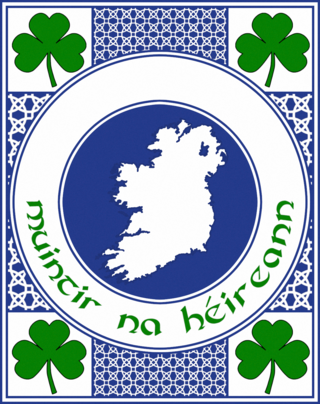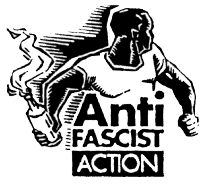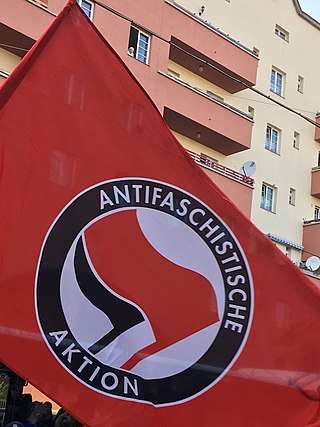Related Research Articles
Column 88 was a neo-Nazi paramilitary organisation based in the United Kingdom. It was formed in the early 1970s, and disbanded in the early 1980s. The members of Column 88 undertook military training under the supervision of a former Royal Marine Commando, and also held regular gatherings attended by neo-nazis from all over Europe. The name is code: the eighth letter of the alphabet 'HH' represents the Nazi greeting 'Heil Hitler'. Journalist Martin Walker described Column 88 as a "shadow paramilitary Nazi group".
The African Progress Union (APU) was founded in London in 1918 as "an Association of Africans from various parts of Africa, the West Indies, British Guiana, Honduras and America, representing advanced African ideas in liberal education". The first president was John Archer. He was succeeded in 1921 by John Alcindor. Others involved as founders included John Eldred Taylor, Thomas Horatio Jackson and Dusé Mohamed Ali.
The National Corporate Party was a fascist political party in Ireland founded by Eoin O'Duffy in June 1935 at a meeting of 500. It split from Fine Gael when O'Duffy was removed as leader of that party, which had been founded by the merger of O'Duffy's Blueshirts, formally known as the National Guard or Army Comrades Association, with Cumann na nGaedheal, and the National Centre Party. Its deputy leader Colonel P.J. Coughlan of Cork. Its secretary was Captain Liam D. Walsh of Dublin.
The National Progressive Democrats was a small socialist political party in the Republic of Ireland, active between 1958 and 1963.

Clann Éireann, also known as the People's Party, was a minor republican political party in the Irish Free State. The party was founded on 25 January 1926 as a result of a split from the ruling Cumann na nGaedheal party, to protest against the Boundary Commission report, which permanently demarcated the border between the Free State and Northern Ireland. Clann Éireann was the leading representative of constitutional republicanism in Dáil Éireann until the success of Fianna Fáil at the June 1927 general election.

The National League was a political party in Ireland. It was founded in 1926 by William Redmond and Thomas O'Donnell in support of the Anglo-Irish Treaty, a close relationship with the United Kingdom, continued membership of the British Commonwealth and conservative fiscal policy.

Muintir na hÉireann was a minor political party in Ireland, with socially conservative and populist policies. It was founded in 1994 and active in the 1990s. The party had one public representative, former Green Party councillor Richard Greene, who served one term on Dún Laoghaire–Rathdown County Council from 1991 to 1999. Greene left the Green Party in protest at its "left-wing social agenda", particularly its refusal to adopt an anti-abortion policy, and his party reflected his views on issues such as family values and the extradition of Irish republicans convicted of terrorist offenses to the United Kingdom.
The British Brothers' League (BBL) was a British anti-immigration, extraparliamentary, pressure group, the "largest and best organised" of its time. Described as proto-fascist, the group attempted to organise along paramilitary lines.

Anti-Fascist Action (AFA) was a militant anti-fascist organisation, founded in the UK in 1985 by a wide range of anti-racist and anti-fascist organisations.
The Covenant Society of the Free Welsh was a society that seceded from Plaid Cymru which was more traditional and anti-socialist.

The National Party was a minor political party in the Irish Free State between 1924 and 1925. It was a splinter group of nine Cumann na nGaedheal TDs led by Joseph McGrath, who had been Minister for Industry and Commerce in the Cumann na nGaedheal government.
The Irish Monetary Reform Association was a minor Irish political party that existed from the 1940s to the 1960s. It can be seen as the most successful of a wave of minor far-right parties in 1940s Ireland, alongside Ailtirí na hAiséirghe.
The Business and Professional Group was a minor political party in the Irish Free State that existed between 1922 and 1923. It largely comprised ex-Unionist businessmen and professionals.

Unite Against Fascism (UAF) is a British anti-fascist group.

The Committee for a Workers' International (CWI) was an international association of Trotskyist political parties and organisations. Today, two groups claim to be the continuation of the CWI, the refounded Committee for a Workers' International and International Socialist Alternative.
The Militant Christian Patriots (MCP) were a short-lived but influential anti-Semitic organisation active in the United Kingdom immediately prior to the Second World War. It played a central role in the ultimately unsuccessful attempts to keep the UK out of any European war.

Post–World War II anti-fascism, including antifa groups, anti-fascist movements and anti-fascist action networks, saw the development of political movements describing themselves as anti-fascist and in opposition to fascism. Those movements have been active in several countries in the aftermath of World War II during the second half of the 20th and early 21st century.
The Anti-Racist Alliance (ARA) was a British anti-racist organisation formed in November 1991. It was established mainly by black activists in the Labour Party.
The New Britain Movement was a short lived political organization in 1930s Britain. It advocated a heterogeneous collection of political ideas including guild socialism, European federalism as a first step to world Federalism, a three way parliament based on the ideas of Rudolf Steiner and a monetary reform that would abolish banks. By the end of 1933 it grew to 77 branches, and its eponymous weekly newspaper had a circulation of 32,000 copies. However the group soon split into four different factions and dissolved in 1935.
References
- ↑ Stefano Fella; Carlo Ruzza (24 December 2012). Anti-Racist Movements in the EU: Between Europeanisation and National Trajectories. Palgrave Macmillan. p. 67-68. ISBN 978-0-230-29090-7 . Retrieved 21 August 2017.
- ↑ Peter Barberis; John McHugh; Mike Tyldesley (26 July 2005). Encyclopedia of British and Irish Political Organizations: Parties, Groups and Movements of the 20th Century. Continuum International Publishing Group. p. 107. ISBN 978-0-8264-5814-8 . Retrieved 21 August 2017.
- ↑ Martin Bright "Secret sect giving PSC mask of respectability" Jewish Chronicle 19 September 2009
- ↑ Peter Barberis; John McHugh; Mike Tyldesley (26 July 2005). Encyclopedia of British and Irish Political Organizations: Parties, Groups and Movements of the 20th Century. Continuum International Publishing Group. p. 119. ISBN 978-0-8264-5814-8 . Retrieved 21 August 2017.
- ↑ Nigel Copsey Anti-Fascism in Britain
- ↑ Nigel Copsey Anti-Fascism in Britain
- ↑ Independent, The (2009-06-10). "What's the best way to fight the BNP?" . The Independent. Archived from the original on 2022-06-18. Retrieved 2022-02-28.
- ↑ Stefano Fella; Carlo Ruzza (24 December 2012). Anti-Racist Movements in the EU: Between Europeanisation and National Trajectories. Palgrave Macmillan. p. 67-68. ISBN 978-0-230-29090-7 . Retrieved 21 August 2017.
- ↑ "Unite Against Fascism: Powerful forces are coming together in a new coalition called Unite Against Fascism to confront the threat of the British National Party" Socialist Worker